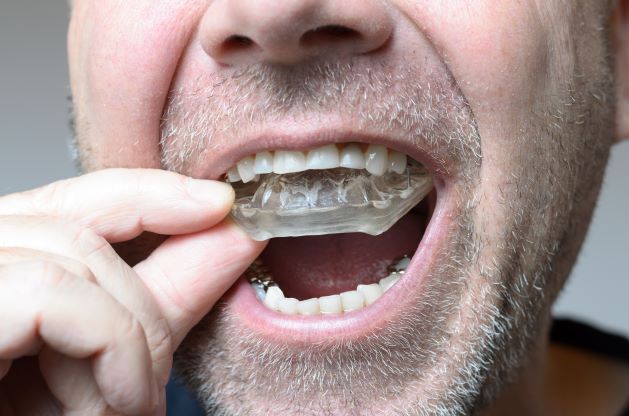Although you might not be totally aware of it, you could be experiencing an orthodontic problem at night. If you’ve been diagnosed with an issue such as sleep bruxism (clenching or grinding your teeth during sleep), temporomandibular joint disorder, or obstructive sleep apnea, then a night guard might be the simple and effective solution you need to restore your sleep and health while protecting your teeth.
What Is a Nightguard?
A nightguard, also sometimes called a mouth splint, is a prosthetic dental device that is worn over the teeth during sleep. Nightguards are made from a durable, yet soft, plastic and are custom-designed to slip securely, snuggly, and comfortably over a patient’s teeth. Different nightguards offer a variety of different benefits and can help address several different orthodontic and sleep-related issues.
7 Benefits of Getting a Nightguard
1. Prevents Teeth Grinding
By covering your teeth with a layer of plastic, a nightguard protects your teeth and tooth enamel from the damage that can occur as a result of grinding your teeth. Teeth grinding is one of the most common symptoms of sleep bruxism and temporomandibular joint disorder, and it can seriously damage your teeth with excessive wear. This wear can lead to all sorts of issues such as tooth sensitivity and cavities.
2. Prevents Jaw Clenching
Another symptom of sleep bruxism and temporomandibular joint disorder is jaw or teeth clenching. Splint-style nightguards can help to prevent a patient from clenching their teeth together at night. Regular-style nightguards at least help to relieve some of the pressure placed on teeth as a result of clenching and can help to protect the enamel and teeth from wear, chips, and fractures that can occur as a result of clenching.
3. Protects Your Gums and Soft Tissues
Overall, the main benefit of any style of nightguard is that it will help to protect your teeth, gums, and soft tissues from damage inflicted as a result of sleep bruxism and/or temporomandibular joint disorder. You will no longer wake up with a bitten tongue or cheek and will not be at risk of having your gums recede as a result of grinding and clenching.
4. Reduces Headaches and Migraines
One of the most common symptoms of temporomandibular joint disorder and sleep bruxism is headaches – both tension headaches and migraines. By wearing a mouthguard, you can help to reduce the tension in the muscles around your jaw joints and in your face, neck, and shoulders. As a result, you’ll suffer fewer headaches and migraines.
5. Decreases TMD Pain and Symptoms
Since a nightguard helps to protect your mouth and jaws from the grinding and clenching associated with temporomandibular joint disorder. You’ll experience less of the pain associated with these disorders, all around. This includes face, jaw, mouth, neck, and shoulder pain in addition to ear aches, tinnitus, and dizziness.
6. Can Help With Snoring and Sleep Apnea
Sometimes an incorrect jaw position that allows soft tissues in the neck and throat to collapse during sleep can be blamed for snoring and obstructive sleep apnea. In certain cases, specially designed nightguards can be worn to correct the position of the jaw, prevent snoring, and keep your airways clear during sleep.
The Process of Getting a Nightguard
The process of getting a nightguard is a fairly simple one thanks to the modern dental treatment tools and technology available in our office. The process begins with a consultation, examination, and evaluation.
At this time, Dr. Bock will examine your teeth and talk with you about your symptoms or the diagnosis you received from your referring dentist or doctor. Depending on our findings and your diagnosis, we can recommend a specific type of nightguard that is designed to best address your symptoms or correct your orthodontic problem.
Once the appropriate type of nightguard has been determined, we’ll take a digital three-dimensional scan of your mouth – there’s no need for you to sit for minutes upon minutes biting down on sticky dental putty and trays. This digital scan provides us with accurate and thorough specifications on all the unique contours of your teeth. We then use this impression to create a custom-designed nightguard for you to wear.
Once your nightguard is ready, we’ll schedule you for a fitting appointment. At this appointment, we’ll have you try on the nightguard so you can let us know if you experience any discomfort or feel any places where the fit isn’t quite right. We can then adjust the nightguard for you in our office until we achieve the fit you desire.
Before you leave, we’ll provide you with instructions on how to wear, clean, store, and otherwise care for your nightguard. We also welcome you to bring it into our office periodically for professional cleaning and sterilization.
Custom-Designed Nightguards With Our Prosthodontist in Loveland, Colorado
At Northern Colorado Prosthetic Dentistry, our prosthodontist, Dr. Andrew Bock has extensive experience in evaluating and fitting patients for custom-designed nightguards. Depending on your needs, diagnosis, and dental health goals, we can design the perfect nightguard for you – whether you’ve received a sleep bruxism diagnosis, suffer from a type of temporomandibular joint disorder, or have obstructive sleep apnea that can be treated without a CPAP machine.
To learn more about nightguards or to schedule a consultation with Dr. Bock, we welcome you to contact Northern Colorado Prosthetic Dentistry in Loveland today.






